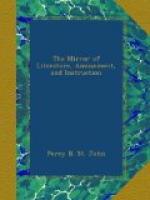B. T. S.
* * * * *
The following inscription, in a churchyard in Germany, long puzzled alike the learned and the unlearned:—
O quid tua te
be bis bia abit
ra ra ra
es
et in
ram ram ram
i i
Mox eris quod ego nunc.
By accident the meaning was discovered, and the solution is equally remarkable for its ingenuity and for the morality it inculcates:—“O superbe quid superbis? tua superbia te superabit. Terra es, et in terram ibis. Mox eris quod ego nunc.”—“O vain man! why shouldst thou be proud? thy pride will be thy ruin. Dust thou art, and to dust shalt thou return. Soon shalt thou be what I am now.”
W. G. C.
* * * * *
THE COSMOPOLITE.
WET WEATHER.
(For the Mirror.)
“John’s temper depended very much upon the air; his spirits rose and fell with the weather-glass.”—ARBUTHNOT.
No one can deny that the above is a floating topic; and we challenge all the philosophy of ancients or moderns to prove it is not. After the memorable July 15, (St. Swithin,) people talk of the result with as much certainty as a merchant calculates on trade winds; and in like manner, hackney-coachmen and umbrella-makers have their trade rains. Indeed, there are, as Shakespeare’s contented Duke says, “books in the running brooks, and good in every thing;"[1] and so far from neglecting to turn the ill-wind to our account, we are disposed to venture a few seasonable truisms for the gratification of our readers, although a wag may say our subject is a dry one.
[1] Only the other evening we heard two sons of the whip on a hackney-coach stand thus invoke the showery deity: “God send us a good heavy shower;” then the fellows looked upwards, chuckled, and rubbed their hands.
In England, the weather is public news. Zimmerman, however, thinks it is not a safe topic of discourse. “Your company,” says he, “may be hippish.” Shenstone, too, says a fine day is the only enjoyment which one man does not envy another. All this is whimsical enough; but doubtless we are more operated on by the weather than by any thing else. Perhaps this is because we are islanders; for talk to an “intellectual” man about the climate, and out comes something about our “insular situation, aqueous vapours, condensation,” &c. Then take up a newspaper on any day of a wet summer, and you see a long string of paragraphs, with erudite authorities, about “the weather,” average annual depth of rain, &c.; and a score of lies about tremendous rains, whose only authority, like that of most miracles, is in their antiquity or repetition. In short, water is one of the most popular subjects in this age of inquiry. What were the first treatises of the Useful Knowledge




